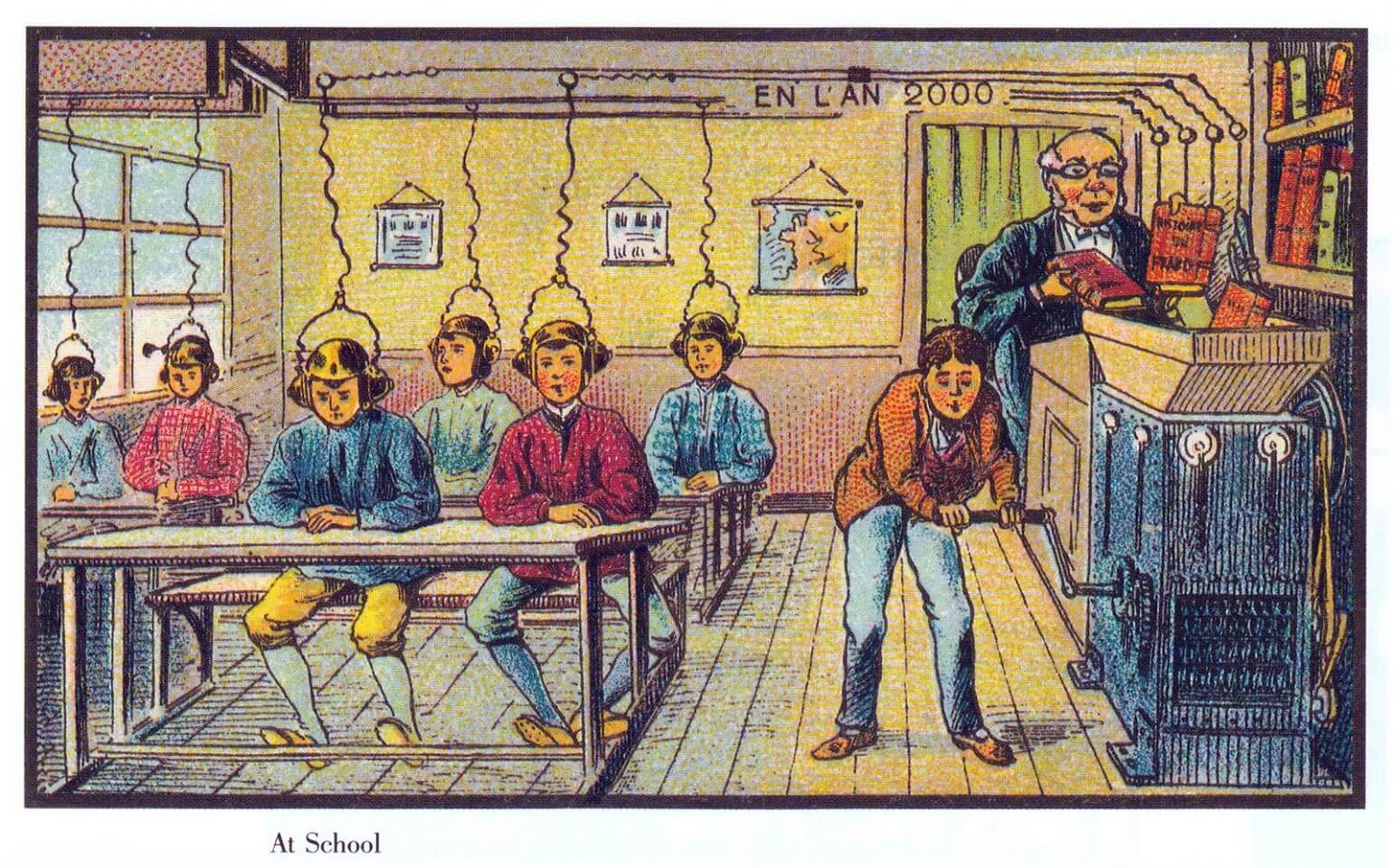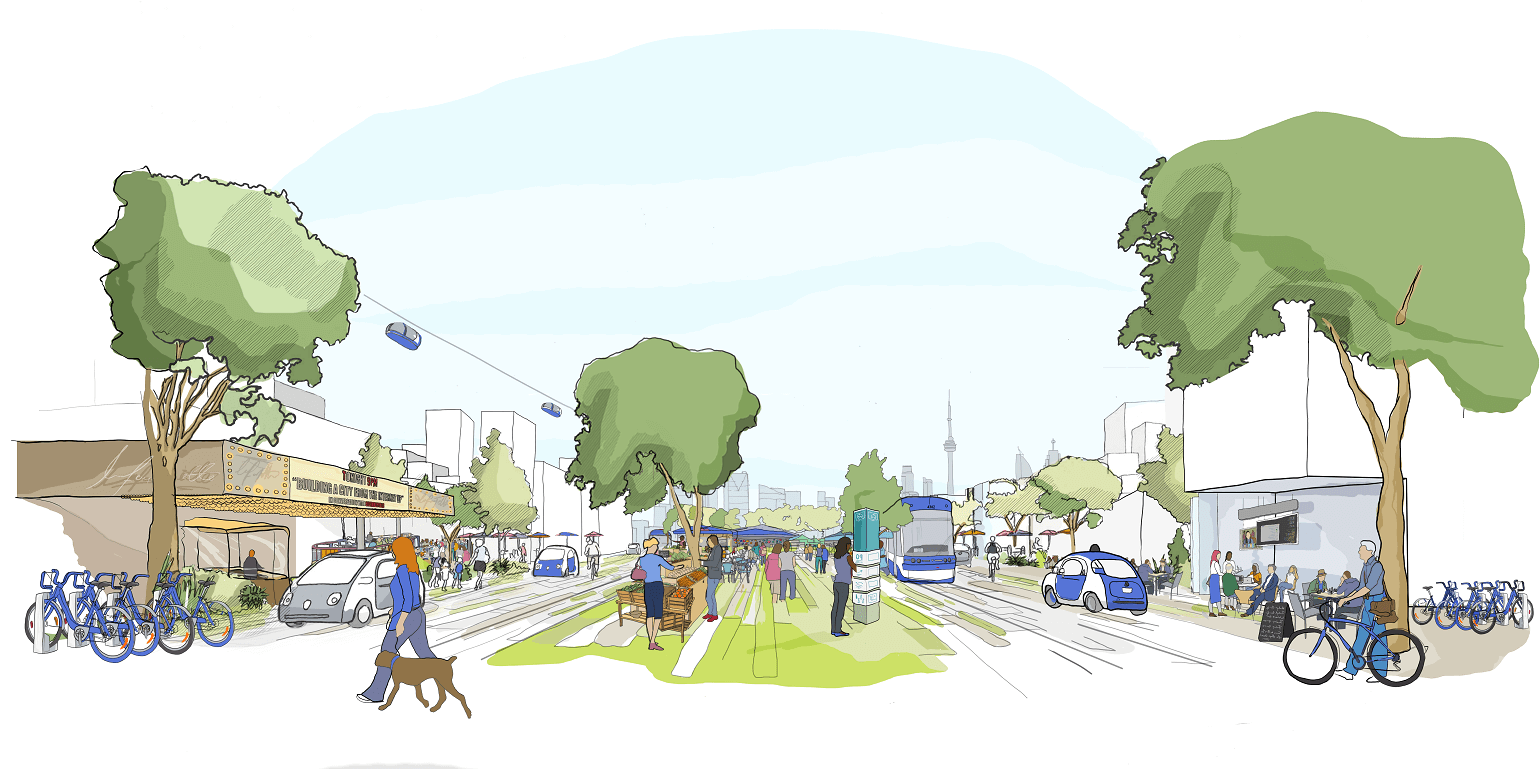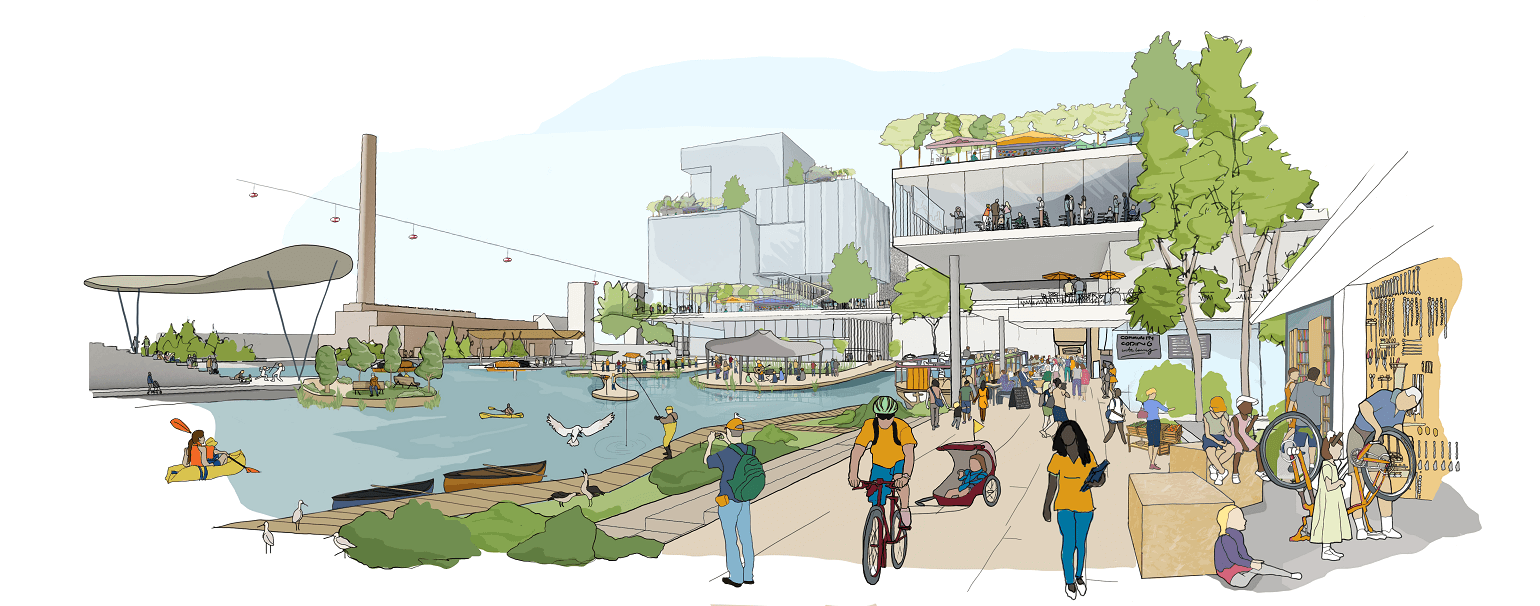In the year 1899, a little-known French artist produced the first of a series of postcards depicting city life in the year 2000.
Some of Jean-Marc Côté’s ideas are fanciful, capturing the whimsical spirit of fin de siècle France: winged taxis transporting passengers, an armored dirigible in the heat of battle, and masked families playing underwater croquet.
Yet other postcards in the series seem eerily prescient, depicting early versions of ideas such as digitally-enabled classrooms, synthesized music, factory farming, and modern weapons of war (examples below).


More than a century later, Google’s parent company Alphabet is trying to do the same with their company Sidewalk Labs: redefine urban life in the twenty-first century.
Unlike Côté, who had only his imagination to build on, Sidewalk Labs wants to use the latest technology to redevelop 800 acres on Toronto’s waterfront in partnership with Waterfront Toronto. Its Quayside project is meant to create a new, inclusive, city-building model that delivers on urban challenges.
That’s their answer to a question that has bedeviled urban planners since the first planned cities of ancient Sumeria: Why is the city of the future never the city of the present?
Here are some of the challenges and opportunities for Sidewalk Labs as it works to combine the imaginative spirit of Jean-Marc Côté with the latest in data analysis and technology-enabled innovation.
What’s Different This Time?
Sidewalk Labs and its CEO, former New York City deputy mayor Dan Doctoroff, aren’t the first to propose a new model for urban design.
The rapid urbanization in the 19th Century following the Industrial Revolution gave birth to urban planning as a modern discipline. In Paris, London, New York City and elsewhere, master planners built new infrastructure, tore down old neighbourhoods, and redesigned city life from the top down.
Yet these best-laid plans of kings and mayors often went awry. The top-down approach has obvious drawbacks—think of the worn patches of grass you see beside elegantly laid paving stones in any city on Earth. These so-called desire paths reflect the way humans use a space, which is never exactly the way the designer intended.
Sidewalk Labs wants to change all that. They want to build a city of tomorrow, today, to show the world what is possible. And Doctoroff and his team say they have an approach that is truly transformational when compared with what has come before. In a word: data.
Data as Transformation Fuel
Cities are data factories: by one estimate, the average North American citizen creates more than 500 megabytes of data per day. That includes information on your route to and from work, what you browse online, and everything you interact with in our increasingly digital world.
Sidewalk Labs says it wants to harness that data to build a better city, and it is that data that separates the Quayside project from similar efforts in the past.
The company plans to embed sensors on nearly everything—sidewalks, streetlights, recycling bins—and combine that information with the latest artificial intelligence tools and advanced analytics.
Early renderings (see below samples) have a science-fiction feel: the vehicles will be self-driving, the buildings will be energy-efficient, the garbage collection will be automated. The project also includes plans for Toronto-specific problems, including massive canopies and heated streets to deal with inclement weather, mixed-use zoning to help alleviate the cost of housing, and child-friendly, car-less roads.


Data Privacy
All of this data usage raises questions about privacy, given the emerging discussion around the power of Alphabet and similar tech companies, as well as concerns about income inequality, as the city of the future could become a playground for the rich.
In its filings, public statements, and a recent Reddit AMA session, Doctoroff has said building a thoughtful privacy policy is vital to Quayside’s success, and is working with former Ontario privacy commissioner Ann Cavoukian to build trust into the system.
Bottom-Up Innovation
The technological challenges of the Quayside project seem straightforward enough in a world where each of us hold a supercomputer in the palm of our hand. Yet the best engineers in the world can never fully account for human behaviour. Put simply, you can’t fully predict a city.
With Quayside, Sidewalk Labs wants to solve the human problem of urban design, a challenge whose difficulty is highlighted by every desire path you walk across. With data, they say they can solve it and build a model for city of the present—and future. Jean-Marc Côté would be proud of their forward-looking spirit, though he would likely add dirigible parking to the Quayside plan.
Want to hear more about Sidewalk Labs and building the city of the future? Join us for the next #RBCDisruptors: The digital city: A moonshot to change the way we live on Jan. 17. We’ll be joined by Sidewalk Labs CEO Dan Doctoroff. Tune in via Facebook Live and follow the conversation on Twitter using #RBCDisruptors.
This article is intended as general information only and is not to be relied upon as constituting legal, financial or other professional advice. A professional advisor should be consulted regarding your specific situation. Information presented is believed to be factual and up-to-date but we do not guarantee its accuracy and it should not be regarded as a complete analysis of the subjects discussed. All expressions of opinion reflect the judgment of the authors as of the date of publication and are subject to change. No endorsement of any third parties or their advice, opinions, information, products or services is expressly given or implied by Royal Bank of Canada or any of its affiliates.





 Learn More
Learn More